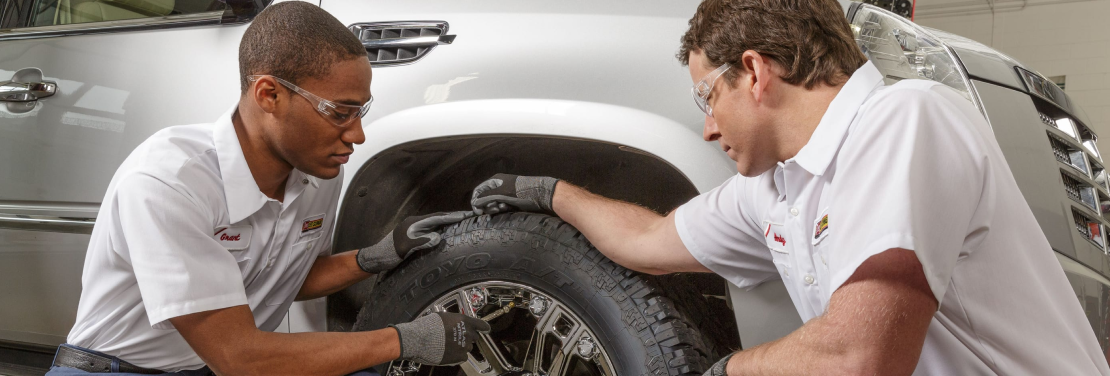Explore Exclusive Mopar Tire Service Specials in Morris Today
Explore Exclusive Mopar Tire Service Specials in Morris Today
Blog Article
Tire Service: Recognizing Tire Pressure Tracking Equipments
Recognizing Tire Pressure Monitoring Systems (TPMS) is a critical aspect of preserving ideal car efficiency and safety on the roadway. With innovations in automobile innovation, TPMS has ended up being a typical feature in contemporary lorries, giving real-time information on tire pressure levels.

Importance of TPMS
The relevance of Tire Stress Surveillance Equipments (TPMS) depends on their capacity to boost lorry safety and performance through real-time tracking of tire pressure levels. Preserving the right tire pressure is vital for ensuring optimal handling, braking, and general security of an automobile. TPMS gives vehicle drivers with immediate feedback on any kind of underinflated or overinflated tires, enabling for timely modifications to be made.
Parts of TPMS
Making up different important components, a Tire Stress Surveillance System (TPMS) works as a sophisticated safety and security function in modern-day automobiles. The primary elements of a TPMS include sensing units, a control component, and a warning sign. Sensing units are generally situated in the tire valve stem or affixed to the wheel setting up, where they gauge tire pressure and send data to the control module. The control component procedures this information and causes a warning if it identifies substantially low pressure in any one of the tires. The warning sign, usually a sign on the control panel, notifies the motorist to examine the affected tire or tires. Some advanced TPMS models likewise present the real tire pressure readings for each tire, providing chauffeurs with real-time details to make sure ideal tire performance and safety and security. By keeping track of tire stress continually, TPMS aids stop accidents, decreases tire wear, and enhances fuel effectiveness, making it a crucial part for car security and performance.
Types of TPMS

On the other hand, indirect TPMS relies upon the car's wheel rate sensors to monitor tire pressure. This system detects underinflation by contrasting the rotational rates of the wheels. Indirect TPMS is less pricey than direct TPMS, as it utilizes existing sensing units within the vehicle.
While straight TPMS offers a lot more exact readings, indirect TPMS is simpler in layout and generally calls for less maintenance. Both systems have their benefits and constraints, and the selection between them commonly relies on factors such as expense, lorry make, and individual preference. Understanding the distinctions in between these two kinds of TPMS can help vehicle proprietors make notified decisions pertaining to tire maintenance and safety.
TPMS Maintenance Tips
Reliable upkeep of TPMS is crucial for making certain optimal performance and security of your automobile. Frequently inspecting the TPMS sensors for any type of damage or rust is vital. Make certain that the sensors are clean and complimentary from particles that might conflict with their performance. Furthermore, it is a good idea to examine next page the sensor batteries regularly and replace them as required to assure exact analyses. Conduct routine checks on the tire pressure degrees and contrast them with the TPMS analyses to ensure they correspond. If there are any kind of disparities, rectify the system adhering to the supplier's standards. Throughout tire rotation or replacement, make certain that the TPMS parts are taken care of very carefully to stop any possible damages. If the TPMS warning light brightens on the dashboard, attend to the issue without delay by inspecting the tire pressures and the general system for any faults. By sticking to these maintenance pointers, you can extend the life-span of your TPMS and improve the safety of your driving experience.
Advantages of Proper Tire Pressure
Preserving proper tire pressure, as highlighted in TPMS Upkeep Tips, is important for gaining the countless benefits related to optimum tire pressure levels. One of the main advantages of maintaining the right tire stress is boosted fuel efficiency. When tires are correctly blown up, there is much less rolling resistance, resulting in much better gas economic climate. In addition, proper tire pressure guarantees even tire wear, prolonging the life-span of the tires and advertising more secure driving conditions. With the right tire pressure, cars likewise have much better handling and grip, specifically in damaging climate condition. This can boost total driving performance and safety for the chauffeur and travelers. Moreover, preserving ideal tire pressure can contribute to a smoother and more comfortable ride by reducing vibrations and noise triggered by underinflated tires. To conclude, the advantages of proper tire stress exceed simply tire long life; they include improved fuel performance, boosted security, much better car efficiency, and general driving comfort.
Final Thought
Finally, recognizing go now tire pressure surveillance systems (TPMS) is important for keeping optimum tire stress and ensuring automobile safety. By acknowledging the importance of TPMS, knowing with its elements, recognizing the different kinds available, adhering to correct upkeep tips, and recognizing click over here now the advantages of maintaining appropriate tire stress, drivers can boost their driving experience and extend the life-span of their tires. Proper tire pressure is crucial to reliable and safe car operation.

Report this page